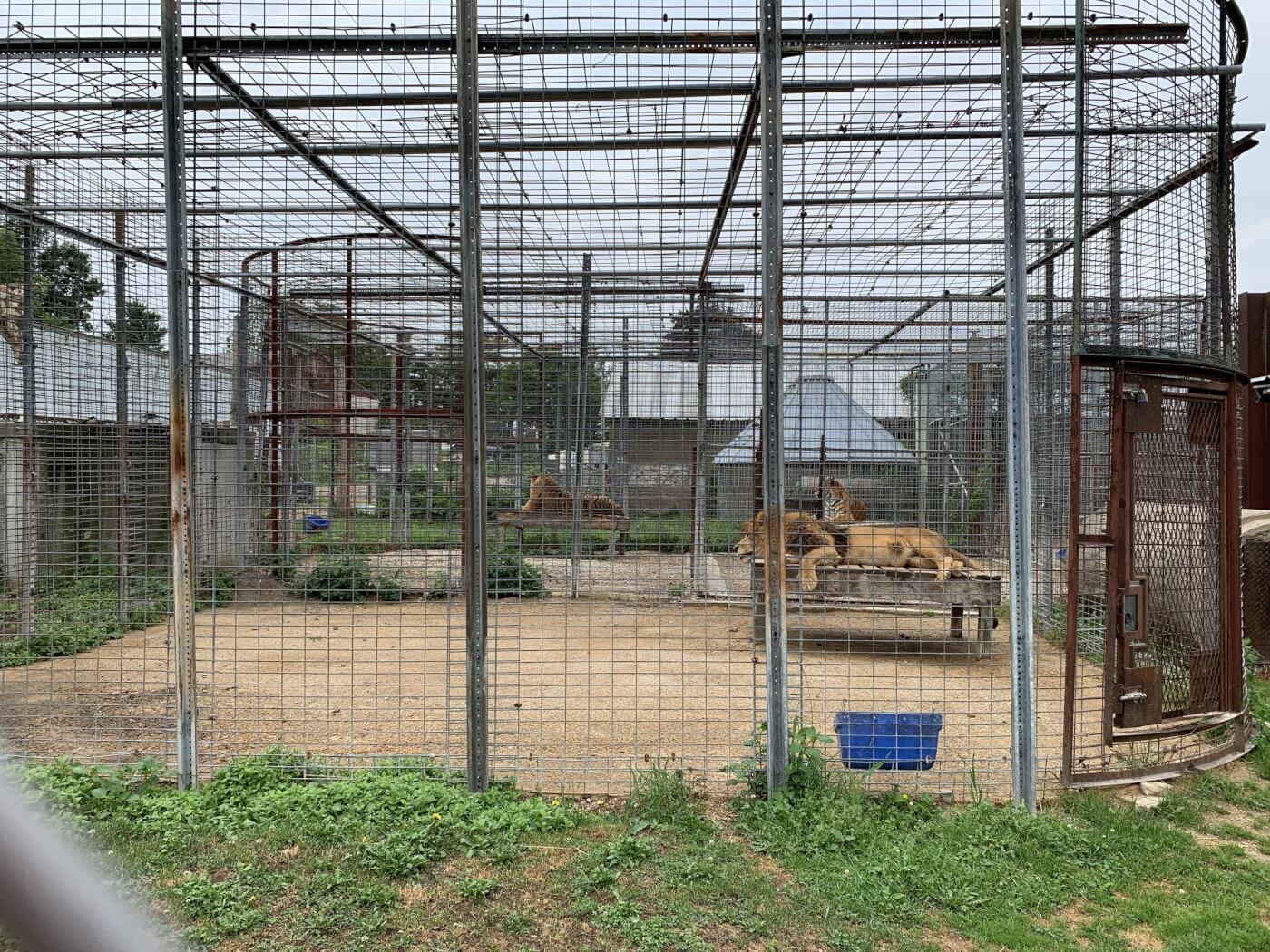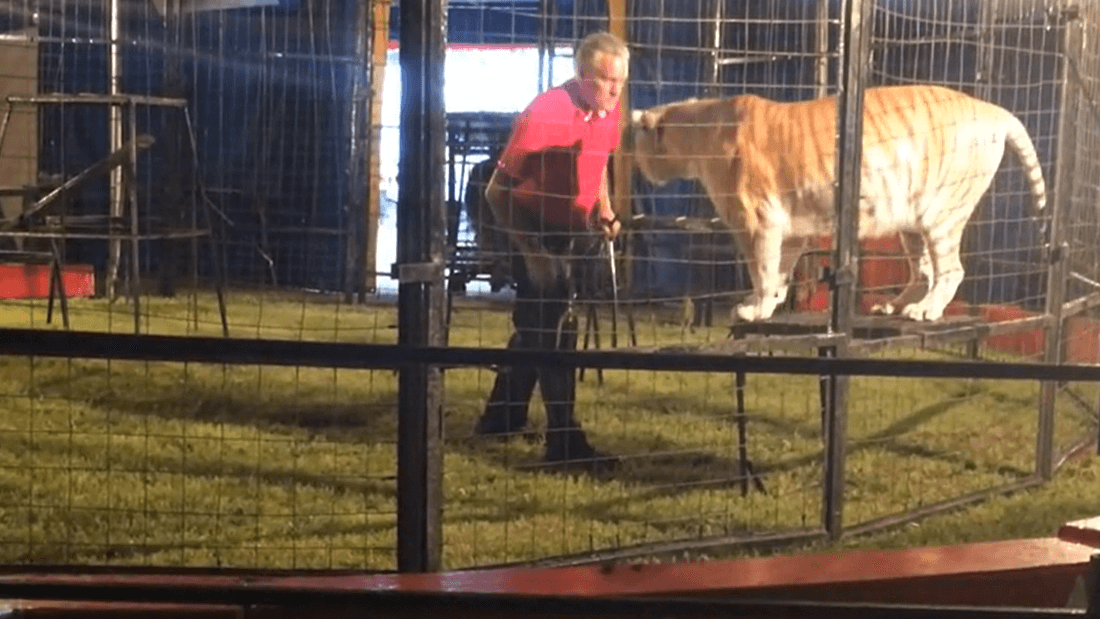PETA Foundation attorneys secured a first of its kind courtroom victory establishing that prematurely separating federally protected big-cat cubs from their mothers and using them for public encounters violates federal law. And now that the Big Cat Public Safety Act has passed, preventing hands-on public interactions with big-cats, PETA is focusing on businesses that tear other baby animals away from their mothers and exploit them for photo ops and other hands-on interactions.
Here are 10 animal exhibitors just as awful as the likes of big cat cub abusers “Joe Exotic,” “Doc” Antle, and other infamous players:
Dawn Hofferber of Animal Haven Zoo
Weyauwega, Wisconsin
Animal Haven Zoo was cited by federal authorities a staggering 17 times in 2023 alone. U.S. Department of Agriculture (USDA) inspectors discovered numerous animals deprived of adequate veterinary care, broken enclosures, and a bear who was given food crawling with maggots.
In just one recent inspection, federal inspectors also found a pigeon with a significant eye injury, an alpaca with runny nasal discharge, a sheep with overgrown hooves, and multiple chickens with severe feather loss and a “white, thickened, crusty material on their feet and legs,” indicating untreated health problems. Other violations included failing to drain standing water, causing a green, algae-like substance to build up around a tiger’s drinking water; failing to prevent the presence of rat droppings found in a primate enclosure; and failing to repair multiple animals’ dilapidated enclosures, some of which had sharp, exposed wires that could injure the animals.
Animal Haven Zoo has a history of shipping animals off to other roadside zoos and disreputable wild-animal dealers. It apparently allowed a local woman to “foster” three infant tigers in her home after they were born at Animal Haven Zoo. The facility reportedly sent two of the young cubs to another roadside zoo and allowed an employee to take one of the cubs to a local school, where he was passed around like a toy. The USDA cited and penalized Animal Haven Zoo for handling this three-week-old cub in a way that exposed him to “trauma, overheating, behavioral stress, physical harm, or unnecessary discomfort.”
Grant Kemmerer of Wild World of Animals
Eighty Four, Pennsylvania
Kemmerer trucks animals to parties and onto TV shows for money. He was also caught on camera repeatedly striking a young tiger in the face at a party in New York.
In 2018, as a result of a PETA complaint, the New York State Department of Environmental Conservation cited Kemmerer for five violations of state wildlife laws—including three violations of New York’s “tiger selfie” law—for allowing partygoers (shown in the video above) to have direct contact with tigers and a lion. The agency fined him a total of $7,300.
In nature, tiger cubs would stay by their protective and nurturing mothers for up to two years, but tiger cubs used for photo ops are torn away from their mothers when they’re just hours, days, or weeks old.
Yellowstone Bear World
Rexburg, Idaho
Yellowstone Bear World is a bear-breeding tourist trap that tears vulnerable, weeks-old cubs away from their mothers and exploits them in public encounters. These bears would naturally stay with and learn from their mothers for the first two years of their lives. The roadside zoo also ships bears to other shady exhibitors across the country. Since 2012, it has sent 96 bears, including eight cubs in 2023, to Gregg Woody, an animal broker known to have sent dozens of bears to the slaughterhouse.
A PETA investigator documented that a cub with a broken leg was denied prescribed pain treatment, traumatized cubs were desperate for their mothers, and an irate supervisor threatened to throw one of the vulnerable cubs across the room and rip out her teeth.
Gregg Woody of Woody’s Menagerie
Mulberry Grove, Illinois
Following numerous complaints from PETA and a USDA lawsuit, the agency suspended Woody’s Menagerie’s exhibitor license for a minimum of 90 days. Previous citations for federal animal welfare violations include one for allegedly confining a visibly ailing goat to a trailer for nine days before notifying a veterinarian. The animal died two days later of pneumonia.
In other incidents, a tiger reportedly suffered from small, black, hairless lesions all over her body for over four months without being seen by a veterinarian; a female bear suffered from gashes and injuries on her paws without being seen by a veterinarian; and a young male lion with treatable health conditions wasn’t given any veterinary care—instead, he was shot, and his body was sold to a local weightlifter.
Roberta Kirshner and the Barry R. Kirshner Wildlife Foundation
Oroville, California
When Kirshner first opened her roadside zoo, she exhibited a mountain lion her now-deceased son had kept illegally at a private residence. She also acquired weeks-old tiger cubs from Joe Exotic. She’s been repeatedly cited by the USDA for numerous federal Animal Welfare Act violations, including for subjecting animals to temperatures of over 100 degrees with no cooling measures. In their natural homes, tigers would take a dip in pools of waters or streams to cool off. Kirshner was also cited for failing to provide a tiger who had an eye injury and a lynx who had leg pain with veterinary care, and allowing members of the public to engage in dangerous direct contact with adult lions, a tiger, and a bear.
The facility has been cited for feeding bears moldy fruit and Cheez-It crackers. A volunteer indicated that bears and coyotes could eat items from an unrefrigerated box of food (including deli meats, tandoori chicken burritos, Lunchables, and crackers).
Trey Key of Culpepper & Merriweather Circus
Hugo, Oklahoma
Trey Key was with Culpepper & Merriweather Circus when the USDA suspended the circus’s license, finding that it demonstrated a “shockingly cavalier attitude regarding the health and safety of animals” there as well as noting that it had no attending veterinarian and didn’t provide animals with adequate nutrition.
In another illustration of his lack of concern for animals, Key paid Joe Exotic $5,000 to house two tigers and a lion for a winter. A former roadside zoo worker testified that Joe used a shotgun to kill five tigers in order to make room for Key’s big cats.
West Coast Game Park Safari
Bandon, Oregon
The owners relegated a young chimpanzee named George to a small enclosure at this highway roadside zoo after the entertainment industry cast him aside when he became too strong to control. Daphne, another chimpanzee there, has spent nearly half a century trapped in inadequate conditions. West Coast Game Park has also forced baby wild animals into photo ops, tearing sensitive bear cubs away from their nurturing mothers in order to make a profit. After PETA alerted the USDA to a suffering leopard named Ninja—found sucking on a raw, untreated wound on his tail—the agency cited the roadside zoo for failing to provide the animal with adequate veterinary care. On a follow-up visit, inspectors documented additional animals suffering, including a bear with extensive hair loss. A solitary peccary was also languishing at the facility with an inflamed eye and overgrown hooves. The USDA concluded that the safari park has a “pattern of personnel not performing adequate daily assessment of animal health.”
Oswald’s Bear Ranch
Newberry, Michigan
At Oswald’s Bear Ranch, the public handles bear cubs for photo ops. Breeders tear cubs away from their mothers and ship them to Oswald’s. These highly disruptive practices result in long-term psychological and physical issues. Observers have seen cubs pacing and crying out—signs of severe distress.
Bears at the facility have died after being trapped in a collapsed den, following a drug overdose, and from other undisclosed causes. Workers have also slaughtered at least six bears at Oswald’s and told a state inspector that “mean” bears should be “harvested” and “made into jerky.”
SeaQuest Aquariums
Multiple locations
SeaQuest is a chain of sleazy aquariums that’s racking up an ever-growing list of dead animals, illegal conduct, and injuries to its employees as well as to the public. Nationwide, SeaQuest aquariums have popped up inside shopping malls, and in just a few years, the shady company has amassed dozens of reports of animal neglect. Hundreds of animals have died at its facilities. Owners of SeaQuest imprison animals indoors, confining them to cramped and crowded enclosures.
Sunrise Beach Safari
Sunrise Beach, MO
This roadside zoo is operated by the notorious animal dealer Tonia Haddix, who faked the death of Tonka the chimpanzee, and who was ordered to pay nearly $225,000 in attorneys’ fees and costs to PETA after she repeatedly committed perjury by providing false testimony in federal court, and she submitted other false information to the court. Haddix claimed that Tonka was no longer at the now-defunct Missouri Primate Foundation because he had died, and her husband signed an affidavit saying he cremated the body. PETA located Tonka in a small basement cage–alive.
Haddix shamelessly continues to put animals in harm’s way by offering “up-close animal encounters” at her new roadside zoo.
Animals are not ours to handle, use for photo ops or as props, or cage and gawk at. They have their own wants and needs and would live far from harmful humans if given the opportunity.
Businesses that capitalize on breeding, buying, and selling sentient beings put profit over the well-being of animals—but victory by victory, we’ll shut them all down.
Click on the link below to help suffering animals languishing at roadside zoos who’ve been robbed of their dignity and put on display for human entertainment.








